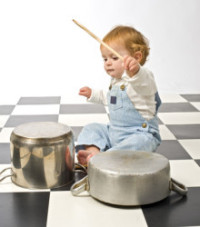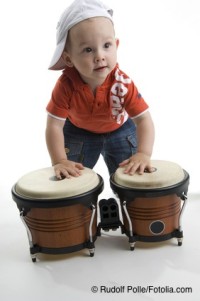
What better way to begin the new year than by talking about new lives and musical beginnings! Babies and music are a source of endless fascination – and the subject of a lot of research. We know that babies like to be sung to (think lullabies), they like bouncing or waving their arms when they hear music, they like toys that make musical sounds, and if musical toys aren’t available, they find their own musical instruments.
Newborns have a wide range of musical abilities, some of which I’ve written about in Are we hardwired for music? Now a recent study by Laurel Trainor and colleagues at McMaster University in Canada shows that babies benefit from musical training even before they can walk or talk. One-year old babies who had participated with their parents in interactive music classes communicated better, showed more sophisticated brain responses to music, and even smiled more.
One goal of the McMaster study was to find out if active musical experience in infancy enhanced an infant’s sensitivity to Western tonality more than passive experience. Researchers also wanted to find out if interactive music-making between parents and infants promoted social, emotional, and communicative development.
They randomly assigned 6-month-old infants to either 6 months of active participatory classes for infants and their parents or to passive music classes where recorded music was played in the background while the infants and parents did other activities. There was also a control group that received no music classes.
Prior to the classes, all of the infants showed similar communication and social development skills. None had participated in any other baby music classes. After the classes, infants were compared on how they responded to Western tonality, their social behaviors, and their use of communicative gestures.
In the active classes, the Suzuki Early Childhood Education curriculum was used and involved learning a small set of lullabies, nursery rhymes and action songs, movement activities, and playing percussion instruments. Parents learned to sing the songs used in the classes and were encouraged to use a CD of songs from the classes to repeat these activities at home every day.
In the passive classes, parents and infants listened to music from the popular Baby Einstein™ CDs while playing together at various art, books, balls, blocks, and stacking cups play stations. Parents used different CDs from Baby Einstein™ to play at home while doing play activities with the infant.
Babies in the active classes, but not in the passive classes, showed earlier sensitivity to pitch changes in music, they preferred to listen to a version of a piece that stayed within the key rather than one containing out-of-key-pitches, and brain imaging showed larger and/or earlier responses to musical tones.
But in a more surprising finding, infants in the interactive classes showed better early communication skills. They also smiled more and showed lower levels of distress when situations were unfamiliar, and when distressed, they were easier to soothe.
All of the infants heard music in the classes and all heard a similar amount of music at home, but  the difference was the interactive exposure to music. It isn’t listening to music that is beneficial, it’s actively participating in music making that makes a difference for children of all ages.
the difference was the interactive exposure to music. It isn’t listening to music that is beneficial, it’s actively participating in music making that makes a difference for children of all ages.
And coincidentally, the Baby Einstein™ series has been found to actually do more harm than good – delaying language development in toddlers. Based on this and other studies, it isn’t very useful for music either.
There have been a significant number of studies with young children that show that music lessons positively affect musical, linguistic and cognitive development, but no previous studies with babies – the McMaster study was a first.
I’ll be writing in future posts about some of the research showing that learning a musical instrument has a variety of long-lasting benefits for older children – and for adults as well!!
In the meantime, it’s a new year – why not make music!!
3 responses to “New year – new musical beginnings”
I have written on this subject, go to my web page:
http://www.pianopractice.org/
Specifically, babies will learn absolute pitch effortlessly with accuracy no adult can learn, if exposed to well tuned instruments (preferably equal temperament) from before birth. Also, they should be taught mental play so that they become good composers.
This post is so very validating for me. Back in the 70’s when I first became aware of music therapy, there was something called “guided imagery”, where, with music as background, a narrator guided people in a relaxed state through a sort of non-specific journey, allowing the participants to fill in their own particular details. I participated in a few of these sessions and was amazed at their power for some of the participants – cathartic is the word that comes to mind. But when I decided to get into music therapy, I also decided to focus on helping people actively make music, intuitively feeling both that was the best use of my skill set, and also that it seems to have more promise for deeper and longer lasting benefits. Intuition can be a hit or miss thing, but it feels great when empirical evidence comes along to support it. Thanks again for all your good work here on the blog – and best wishes for a wonderful new year.
Thanks for your comments, Lyle!! I agree that it does feel great when empirical evidence supports what we’re already doing. Sometimes these brain explorations support our work, sometimes they give us new ways of thinking about teaching or learning. I’ll write more in the next few weeks about benefits of making music, as opposed to listening, for both children and adults. Hope you have a great new year.